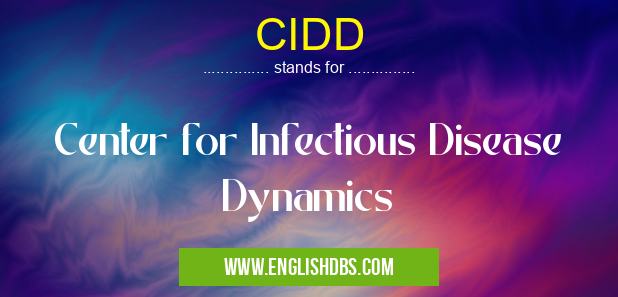What does CIDD mean in DISEASES
The Center for Infectious Disease Dynamics (CIDD) is an interdisciplinary research unit based at Pennsylvania State University. It is focused on discovering new methods to understand the spread and transmission of infectious diseases, including the role of environmental factors, animal reservoirs, and human behavior. Through its diverse programs in mathematical modeling, field-based epidemiology, social science and evolutionary biology, CIDD seeks to better understand and ultimately prevent the spread of disease. In doing so, it works with governmental organizations, non-governmental organizations and other academic institutions across the globe to improve our knowledge and ultimately reduce the burden of disease on populations around the world.

CIDD meaning in Diseases in Medical
CIDD mostly used in an acronym Diseases in Category Medical that means Center for Infectious Disease Dynamics
Shorthand: CIDD,
Full Form: Center for Infectious Disease Dynamics
For more information of "Center for Infectious Disease Dynamics", see the section below.
Mission
CIDD's mission is to create a better understanding of the transmission dynamics of infectious diseases and how they are affected by environmental factors, animal reservoirs, and human behavior. This knowledge can then be used to more effectively monitor outbreaks, evaluate interventions, prioritize resources for prevention strategies aimed at controlling these diseases worldwide. Our goal is to use scientific research as an agent for positive change in public health systems across all countries by striving for improved global health security through enhanced disease surveillance capacity.
Essential Questions and Answers on Center for Infectious Disease Dynamics in "MEDICAL»DISEASES"
What is the Center for Infectious Disease Dynamics?
The Center for Infectious Disease Dynamics (CIDD) is a research center at Penn State University focused on the study of infectious diseases and their effects on humans, animals, and ecosystems. We use scientific approaches to understand how pathogens spread, how to prevent, detect, and respond to disease outbreaks, and how humans and animals interact with each other in response to disease.
What type of research does CIDD conduct?
CIDD's research covers many areas of infectious disease such as epidemiology, ecology, evolution, behavior change, virology, mathematics modeling, and policy development. We focus on creating an interdisciplinary approach that combines traditional scientific methods with innovative technologies to better understand the dynamics of infectious diseases.
What kind of resources does CIDD offer?
CIDD provides a variety of resources including educational seminars and courses, training opportunities for postdoctoral researchers and graduate students, access to cutting-edge technology platforms used in our research projects, as well as networks of experts across disciplines who are working in the field of infectious disease dynamics.
How do I get involved with CIDD?
There are many ways to get involved with CIDD! You can join a course or seminar at Penn State University related to infectious diseases; become a postdoctoral or graduate student researcher; volunteer your time or services; participate in public outreach activities such as webinars or Q&A sessions; apply for one of our fellowship programs; support us financially through donations or grants; or simply stay up-to-date on our news by following us on social media!
Who leads CIDD's research projects?
Each project team is led by one or more faculty members from Penn State's Department of Biology or other departments within the university. Faculty members work closely with graduate students and postdocs who are heavily involved in developing new research questions based on their own expertise and knowledge base.
Is funding available for new projects at CIDD?
Yes! Our center works closely with individuals interested in applying for external funding for their proposed research project ideas related to infectious disease dynamics. Additionally, we regularly host fellowship competitions open to individuals from all academic backgrounds who have creative ideas for studying this crucial field.
Does CIDD collaborate with other organizations?
Absolutely! We are proud partners of local governments as well as national organizations such as WHO and global health foundations like Wellcome Trust. We work together closely to develop comprehensive strategies tailored towards controlling or mitigating the spread of existing infectious diseases while remaining watchful against emerging threats worldwide.
Are there any online platforms dedicated specifically towards studying infectious diseases offered by CIDD?
Yes! Our Knowledgebase Platform is designed specifically for scientists and others interested in exchanging information regarding new developments in the field of pathogen ecology/epidemiology worldwide. This platform also hosts various learning modules covering topics such as introduction/basic concepts around infectious diseases/biology as well data analysis tools applicable within this field.
DoesCIDD provide any tools for predicting potential outbreaks?
Yes — we deploy advanced mathematical models that take into account several factors including host population size & distribution; pathogen transmission characteristics (mode & probability), seasonality patterns etc., which inform forecasts about potential outbreaks over certain geographic locations & timescales both short-term & long term. These forecasts are useful not only from a bio surveillance perspective but also help devise effective intervention strategies when necessary.
Are there any ways I can help support the incredible work being done by CIDD?
Absolutely! Donations made directly towards supporting our center are tax deductible under US law. You can also become an ambassador by spreading awareness about our cause through word-of-mouth campaigns or participate in outreach activities like giving lectures at schools & universities emphasizing magnitude & impact of infections diseases globally.
Final Words:
The Center for Infectious Disease Dynamics works tirelessly to apply scientific principles in order to develop innovative ways to reduce the global burden of infectious diseases. With a focus on mathematical modeling, field-based epidemiology, social science and evolutionary biology CIDD seeks to gain a deeper understanding of disease transmission dynamics that can be used to inform more effective public health policy initiatives. By leveraging evidence-based insights gained from its research efforts CIDD aims to promote global health security and improve public health outcomes across all countries.
